Marques Harris’s television flickered with images of the sport to which he’d dedicated nearly two decades of his life, and now he felt pangs of nostalgia. So he did what hardened men are too often reluctant to do: He let a friend know that he missed him.
As the former Chargers linebacker watched the Bills and the Chiefs clash in the AFC Championship in January 2021, one of his first NFL buddies sprang to mind. Harris had entered the league with San Diego in ’05 alongside receiver Vincent Jackson, and now their longtime teammate, defensive lineman Jacques Cesaire, was an assistant with the Bills, who were one win away from a trip to Super Bowl LV in Tampa. If that happened, Harris thought, it was about time for a long-overdue reunion, after the pandemic had kept them apart—Jackson in Tampa, where he’d ended his career; Harris in Colorado; and Cesaire so often on the road.
If Buffalo wins, I’m going to come to Tampa Bay, Harris texted Jackson. I would love to see you.
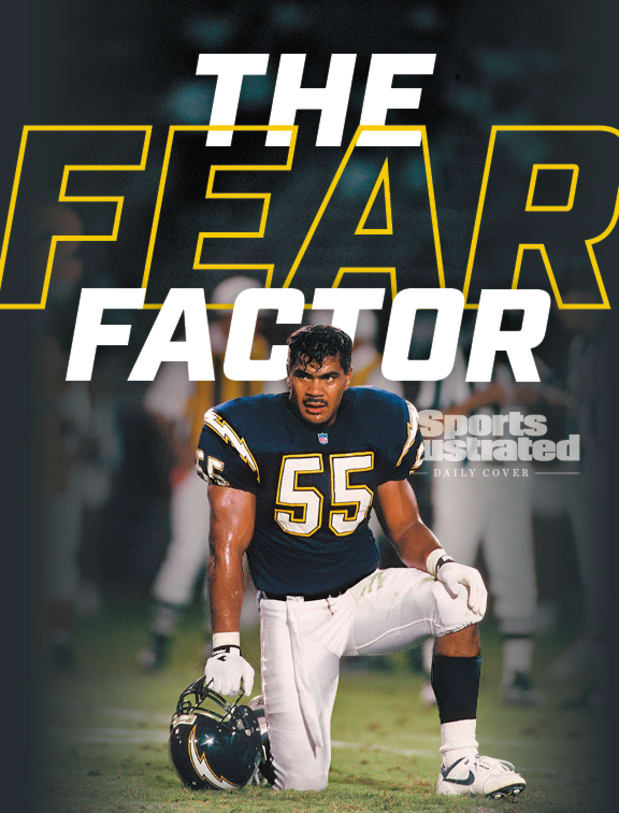
John W. McDonough/Sports Illustrated
Jackson, a quiet, lead-by-example man with an iron physique and an intellect to match, was among the teammates Harris had admired most. The two shared a locker room for five seasons in San Diego, and Jackson attended both Harris’s bachelor party and his wedding. So Harris wasn’t particularly alarmed when his old friend didn’t immediately respond. He knew that Jackson kept busy with his kids, his foundation, his burgeoning real estate and restaurant businesses.
Harris, though, didn’t know that he was texting a man who by then had been holed up in a hotel room outside of Tampa for two weeks as semis rumbled down I-75 outside his window. He didn’t know that his 38-year-old friend’s frontal lobes had shrunk. Or that the damage had triggered forgetfulness and paranoia. Or that Jackson had suffered depression in the six months after his 12-year NFL career ended, in 2016. Or that the only remedy he found for his loss of identity and mental acuity was at the bottom of a bottle, and that drinking had led Jackson and his wife, Lindsey, to shield their four children from his deterioration, setting him on a course to that lonely hotel room.
Harris, when he texted, had no idea that Jackson was alone, drinking himself to death. He only knew that he missed his friend.
The Bills, ultimately, lost. The texts went unreturned. For Harris, a father of five, life marched on. For Jackson, it didn’t. On Feb. 13, three weeks after that playoff game, housekeepers entered his hotel room and thought he was asleep when they saw him hunched over, motionless, on a sofa. The next day, they thought the same. On the 15th, a cloudy Monday, they found him in the same position and called 9-1-1. Jackson’s blood alcohol level, an autopsy would later reveal, registered at 0.28%, around the point at which most people lose consciousness.
That news devastated Harris not only because he’d lost a friend, or because that friend had seemed better prepared than any player Harris knew to find light in the void that often follows a career’s final whistle. Harris was floored because Jackson was the sixth former football friend who had either killed himself or died in despair—a list that includes Heisman winner Rashaan Salaam and pro football Hall of Famer Junior Seau, both of whom ended their lives with a bullet.
Weeks passed after Jackson’s death. Eventually, grief began to subside—but Harris couldn’t escape the emotion that crept into its place.
“Fear.”
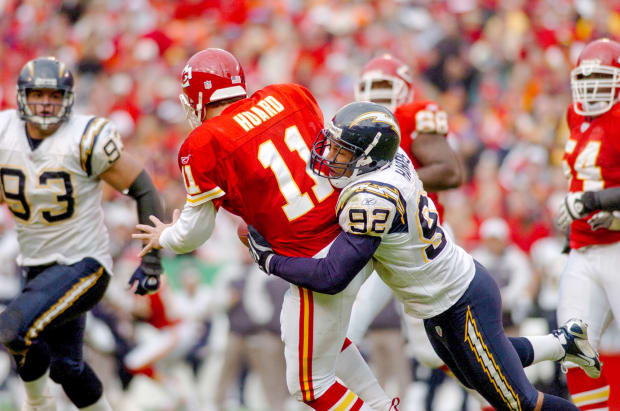
John Rieger/USA Today Network
In 2022, Charles Johnson, a former receiver who went to Super Bowls with two teams and later said he had suffered brain, head, spine and neck injuries, died by suicide at age 50. Marion Barber, a running back with the Cowboys and the Bears, died at 38 of heat stroke after a long string of mental health issues. Tony Siragusa, a Colts and Ravens defensive tackle, fell asleep at 55 and never woke up. (The direct cause of his death remains unconfirmed.) Shane Olivea, a Chargers and Giants lineman, was felled at 40 by a heart condition after struggling with prescription painkiller addiction. William White, a safety with three teams, succumbed to ALS at 56.
In April 2021, Phillip Adams, a journeyman corner, fatally shot six people and then himself. He was 32. Demaryius Thomas, who won a Super Bowl with the Broncos, died at 33 from complications of a seizure disorder. Geno Hayes, a linebacker with the Buccaneers and Bears and Jaguars, died at the same age of liver disease, which he’d attributed, in part, to a career spent taking over-the-counter painkillers. For Parys Haralson, a 49ers and Saints linebacker, it was a stroke, at 37. And Greg Clark, a 49ers tight end, shot himself in the head after exhibiting myriad symptoms of CTE. He was 49.
In all, 44 current or former NFL players aged 50 or younger have died since the start of 2021, according to Pro Football Reference. While pro footballers tend to have longer lifespans than the general population (thanks, in part, to their fitness levels, wealth and access to first-rate healthcare), they are more vulnerable than their counterparts in other sports to suffering neurodegenerative or cardiovascular disease. And more likely to die of suicide.
The root causes of football’s unique impacts have been well documented, from repetitive head trauma to chronic pain, and so on. Often overlooked, though, in these grim headlines are the players who can’t help but see themselves in each fallen peer.
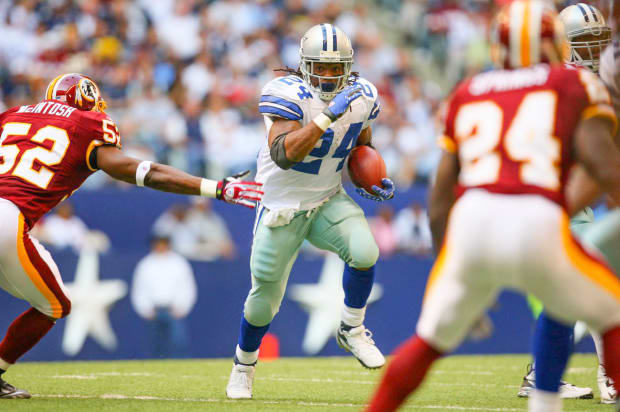
Damian Strohmeyer/Sports Illustrated
Players like Harris. In the months following Jackson’s death, Harris, who’s now 41, began visiting a medical facility outside Denver that specializes in brain health. There he engaged in a four-week program designed to combat an onslaught of burgeoning and unfamiliar feelings: rage, memory loss, lapses in concentration. For one exercise, Harris strapped into an amusement-park-gyroscope, the tilting and spinning of which trained his brain to react to stressors without triggering fear or anger. For another, he tapped lights illuminated on a wall in front of him, aiming to improve his balance and reaction time. Harris was desperate to reinvigorate the neural pathways that he’d become increasingly worried about withering—and when test results four weeks later showed improvements, he clung to them like a lifeline.
Motivated by Jackson’s death—and by Seau’s and Salaam’s and all the others’—Harris sought to spread the word to any former teammates who would listen. Check in on one another. Seek psychological help. Don’t suffer in silence. He feared that if his former teammates—some of the sturdiest men he knew—couldn’t escape the game’s most dire consequence, perhaps no one could.
“I don’t want to just sit around and wait for something to happen,” Harris says. “It’s definitely scary.”
When Junior Seau fired a bullet into his own chest in 2012, Jackson was among the legion of NFL players disquieted by the news. So, too, was Ray Crockett, who’d retired a decade before Seau’s suicide, and who’d long counted the linebacker as a friend.
Crockett, who in his 14 years at cornerback won two Super Bowls with the Broncos, had seen Seau at a charity golf event only a week or so before his death. The two would often encounter each other in San Diego, where Seau lived and owned a restaurant, and where Crockett owned condos. And that day, Crockett remembers, the boisterous linebacker was “full of vigor and smiles.” (Two years earlier, Crockett had dined in Las Vegas with former Bears safety Dave Duerson, the two old defensive backs discussing their latest business ventures and future ambitions. Months later, Duerson killed himself much in the same manner as Seau, indicating in a suicide note that he wanted his brain to be preserved and studied.)
It was around the time of Seau’s death that Crockett says he started struggling to sleep. He would catch himself staring out the window. He would worry about the strange noises he heard when he knew his house was empty. He says he was diagnosed with anxiety and depression. Later, when reports started to trickle out about Seau’s insomnia and mood swings, and Duerson’s headaches and fading memory, Crockett says he became enveloped in fear. “I just got diagnosed,” he thought, “with the same s— they killed themselves over.”
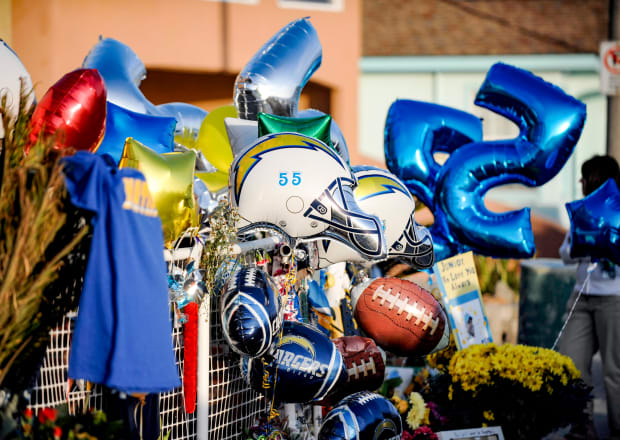
Denis Poroy/Getty Images
Crockett’s subsequent spiral—his divorce and and poor financial decisions, paralleled by drug and alcohol abuse, much of which he attributes to the sense of identity he lost when his career came to an end—reached the point where in 2013 he says he found himself sitting alone for hours on a closet floor one night, a pistol in his lap. He couldn’t escape the shadows cast by Seau and Duerson. He was convinced that his own end would mirror theirs.
“I had the same thoughts [that they did],” he says. “Are these headaches worth it? Are these feelings worth it, not understanding what the f— is going on with me?
“I’ve never been emotional. I’ve never needed a hug. I’ve always been the toughest guy, the smartest guy,” Crockett says. “Now, I’m forgetting s---. Can’t find my keys. Not remembering words. All kinds of stuff I’d never experienced.” So Crockett spent the loneliest night of his life on that closet floor, cradling a pistol and sobbing.
Ultimately, Crockett says he came to realize that the bullet he’d hoped might quiet the noise was stuck in the chamber. The malfunction left him more time to wrestle with himself, and with the memories of his peers. He says he thought about Seau’s four children, then about his own two sons, and what their lives might look like without a father. “And I [could not] allow that to be my family,” he says.
Crockett decided that night that instead he would attempt to keep the delusions and depression at bay. Today he sees a therapist and a psychiatrist, and he attacks each day, he says, as if he were pressing a receiver at the line of scrimmage, fearful of letting dark thoughts slip past.
An NFLPA representative during his playing days, Crockett looks at the league now and says the offerings for retirees—from both the players association and from the league—have improved in recent years, but he resents how long it took to get to the point of helping an aging cohort who need help the most. Moreover, he believes that those improvements (including the introduction in 2013 of The Trust, a robust program designed to help retired players address a range of needs, from career counseling to financial planning to mental health) were driven not by charity but by necessity, citing the ’16 settlement in which the NFL ended up providing roughly $1 billion to aid former players “diagnosed with certain neurological disorders.”
“Let’s just be real,” he says. “It’s because of f—ers dying. You get sued and you lose [all that money]—I think that would make me do [things] a little different as well.”
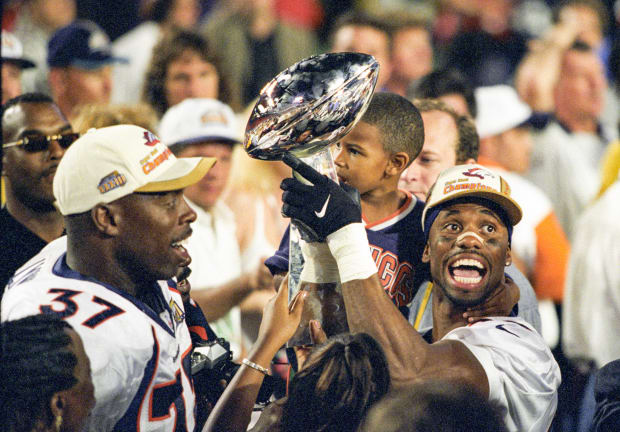
Allen Kee/Getty Images
When Bills safety Damar Hamlin’s heart stopped and he collapsed on the field during a Jan. 2 Monday-night game, shockwaves of fear rippled through current and former players alike. It wasn’t the first time this season, though, that players were jolted by what they witnessed. In the second quarter of a Week 4 clash in Cincinnati, 340-pound Bengals defensive tackle Josh Tupou corralled Dolphins quarterback Tua Tagovailoa by the waist and slung him to the ground. The 24-year-old signal-caller’s head bounced off the turf, the impact causing his hands to seize up and his fingers to curl like pretzels as he lay unconscious. Al Michaels, rarely one to struggle for words, mustered only a dazed “Uh-oh” as the Amazon Prime broadcast zoomed in. A pall fell over the crowd, and Tagovailoa was stretchered off the field—with no rote thumbs-up, no relieved applause—to a waiting ambulance.
That incident came only four days after Tagovailoa, in a game against the Bills, landed awkwardly on his head, wobbled and had to be propped up by teammates, also in front of a millions-strong television audience. The net effect of the two incidents was a public outcry—and a private one. After the scene in Cincinnati played out, 31-year-old NFLPA president JC Tretter, a former center with the Packers and Browns, watched his phone begin flashing with messages from active players.
See what happened?
How did this happen?
This can’t happen again.
They demanded answers. Protection. Protocols. And hidden in those pleas was a concern about the invisible line connecting a 24-year-old quarterback, lying unconscious on the field, to Vincent Jackson, sitting dead for three days in a hotel room by the interstate.
The messages on Tretter’s phone lacked the acute fear of, say, Marques Harris, but they demanded actions that would help keep that sort of fear at bay, enabling players to feel protected—by rules and enforcers—while engaging in a supremely violent sport.
So Tretter engaged in conversations throughout that evening and into the subsequent days about how to better hold teams, the league, even players accountable to ever-evolving concussion practices shaped by ever-evolving science.
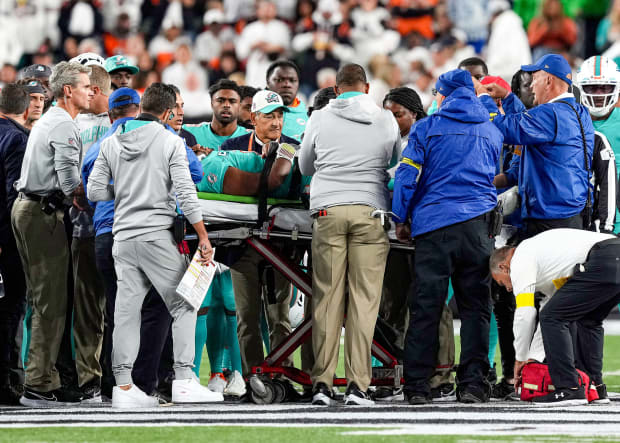
Dylan Buell/Getty Images
Tretter, over his own eight years in the league, had grown accustomed to playing through profound pain. He says NFL players, in general, are used to going to “a really dark place” in order to stay on the field. Because NFL careers are so short—average length: three years—and because opportunities are so fleeting, he says that most players will expose themselves to tremendous personal risk unless forced by the rules to the sidelines. And on the night Tagovailoa was wheeled off, Tretter realized that he and the players he represented needed to erect firmer guardrails, in many cases to save players from themselves. (Tagovailoa, it’s worth noting, entered the NFL’s concussion protocol twice this season—after the Bengals game and after another incident in Week 16—and he missed six games.)
Tretter hasn’t yet lost any former teammates to CTE or suicide or heart disease, but whenever he reads about another young player dying, he says he turns inward. “You might not have met the person, or know the person, or have played with the person—but they were in your shoes, doing the same things you were doing,” he says. In those moments, he’s always led to “some private self-reflection, thinking through my decisions and the choices I have made.”
Tretter, at his age, says he doesn’t yet worry about the future himself, but it’s never far from his mind. He knows linemen are the most vulnerable to the repetitive head impacts that studies have shown to leave players more likely to suffer from CTE or other neurodegenerative diseases, and that have a correlation with shorter lifespans.
“It’s not like I’m immune to the issues that other players have faced,” he says. “You need to be acutely aware of how you are feeling mentally.”
The men who 20-odd years ago gathered each fall in the Chargers’ receivers room developed bonds that transcended free agency, retirement or relocation. One group of players—Jackson, Keenan McCardell, Greg Camarillo, Kassim Osgood, Malcom Floyd and Eric Parker, as well as their position coach, James Lofton—maintained a longstanding text thread, on which they’d check in on one another, trade jokes and, on occasion, revel in the news that one of them had become a husband or a father. McCardell, whose career was nearing its end when Jackson first stepped into that room, in 2005, took pride in mentoring the new guy, watching him grow and thrive on the field and off, where Jackson finished his college degree, launched a successful commercial real estate company and started a foundation to assist military families.
McCardell remembers sharing drinks with Jackson just a few years before Jackson’s death, toasting their mutual prosperity. Camarillo saw Jackson at an NFLPA convention around the same time, and he recalls encountering a besuited businessman who seemed to have mastered post-NFL life. Jackson, they say, offered no hints of his profound personal crisis, not in those encounters or on their text thread. He made no cries for help to those with whom he’d shared a locker room and enduring friendships. So, when news of Jackson’s demise eventually hit the thread, “I was frozen,” McCardell says. “There were some guys that were really hurt.”
That hurt prompted the old friends to tell one another, in essence: If you need help, reach out. “Football players are good at hiding [pain],” Camarillo says. Jackson’s death “created a pathway for us to open up. ‘Vince was struggling. I’m sure other folks are struggling. Well, it’s O.K. to talk about that.’”
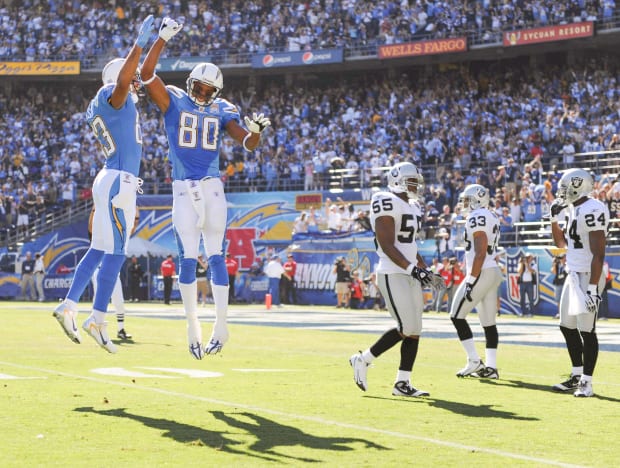
Kirby Lee/Image of Sport/USA Today Network
It was ultimately Harris—their defensive teammate in San Diego and Jackson’s longtime friend—who put those sentiments fully to action. Harris reached out to another old Charger, offensive tackle Roman Oben, who today serves as the NFL’s vice president of football development. “Roman,” he asked, “what can we do?”
From that conversation sprang an impromptu—and, for the NFL, seemingly unprecedented—set of meetings across the spring and summer of 2021. Working with the Chargers, Harris and Oben canvassed old teammates who’d played between 2000 and ’10 and set up a series of regular Zoom calls where they could share their grief, fears and frustrations with an audience inclined to empathize.
Some 20 former Chargers (along with the team’s psychologist of the past 17 years, Dr. Herb Martin) gathered for the first call in March 2021, only a month after Jackson’s death. They ruminated at first on Jackson, sharing how his loss had shaped their own thoughts and feelings of pain and confusion, but eventually they opened up with each other, too, about problems that might be driving them down a similar road: financial worries, marital strife, mental and physical struggles.
The raw honesty expressed in those conversations heartened Martin, who’d spent two decades dealing with men trained to mask pain and obscure fear. The old teammates, he says, “were able to share how they felt in a real way, unencumbered by stuff that we do as men with respect to shielding [emotions]. … It’s important for the general public to understand that [players] are very vulnerable. They’re human, just like us.”
Those meetings persisted monthly, through August 2021, each drawing as many as 20 former players. Now Martin wants to take the gatherings offline, in person, and the Chargers are on board. Presumably, those meetings could help address a common complaint among former players.
“One of the biggest things I hear,” says Harris, “is: ‘I’m done [playing] and the team doesn’t care about me.’ Or: ‘I don’t get invited to games.’ Or: ‘There are no resources.’ To be honest, I’ve had those feelings in the past as well.”
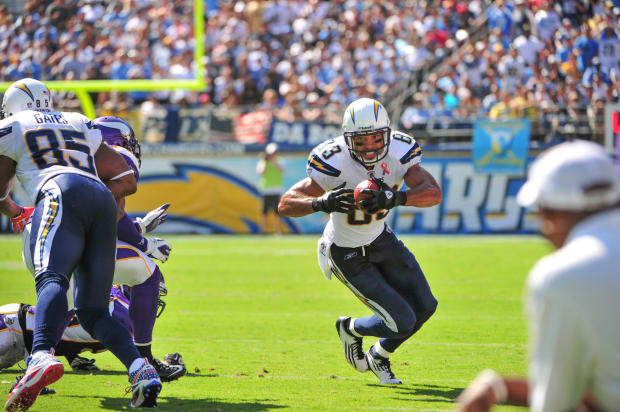
Robert Beck/Sports Illustrated
Harris, after retiring in 2009, remembers not being able to watch football for two years, such was his struggle with the loss of identity and structure after two decades in the game. He shared as much on the Chargers’ calls, and while most of those conversations centered on day-to-day difficulties—finding a new purpose or mending relationships—the specter of CTE loomed over it all.
McCardell worries broadly about his brain, though he tries not to dwell on it. For Camarillo, the fear is more acute, particularly in the wake of Jackson’s death and subsequent diagnosis of Stage 2 CTE, which is characterized by mood swings, memory loss and headaches. Camarillo has not yet encountered problems like Jackson’s, but he understands they could be lurking. And he knows: No amount of camaraderie or support on a Zoom call will ever be able to remedy that. “[We were] literally the same age—we came into the league together,” he says. “If [Jackson] had CTE, then we all could, and that’s scary.”
Much as Keenan McCardell years ago served as a mentor to Vincent Jackson in San Diego, Jackson played the teacher when a tall, talented rookie receiver named Mike Evans walked into the receivers’ room late in Jackson’s career, with the Buccaneers, in 2014. Evans, former teammates have implied, entered the league averse to conditioning drills; but he was assigned a locker next to Jackson, who trained incessantly to keep his tall frame lean and strong—and Jackson, it seemed, rubbed off on the rookie. Beyond the rigorous fitness routine, Evans took note, too, of the attention Jackson paid to his real estate and restaurant businesses. Says Evans: “He was the guy that everybody wanted to be.”
Out on a date with his wife in Tampa during the Bucs’ 2021 run to the Super Bowl, Evans happened to drive by Jackson’s restaurant, Cask Social Kitchen. It was late, and the restaurant was on the cusp of closing for the evening, but Evans still took a moment to dial his old mentor in hopes that he might be free to catch up. Jackson, who by then was spending his nights at the Homewood Suites, didn’t answer. He never called back. A few weeks later, back home in Texas, Evans found out why.
The two men had shared a position. Split reps. Played a similar style. Their bodies took a comparable toll from their sport. Still, despite those parallels, Evans refuses to let the fear of the future impede upon the present. To a 29-year-old in his relative athletic prime, the manner of Jackson’s death feels like an abstraction, not a destination, even if the experiences of Jackson’s Chargers contemporaries suggest that perception might shift with time. “I’m fine,” Evans says. “I’m not thinking about it happening to me, but I’m hurt by what happened.”
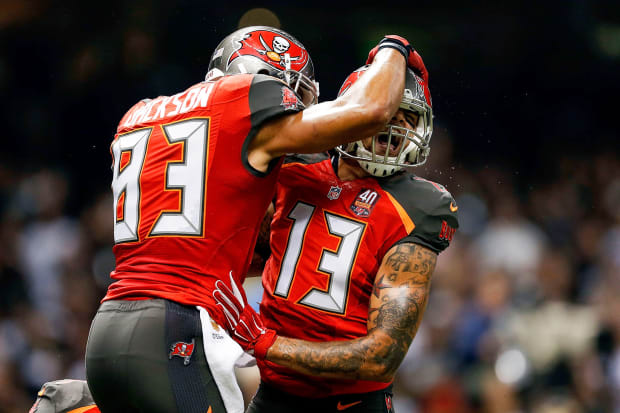
Wesley Hitt/Getty Images
Cask Social Kitchen is not your stereotypical sports bar propped up by some famous athlete. The restaurant’s exposed brick walls and concrete floors befit any chic new eatery in a trendy pocket of the city. Which was all by design. Jackson’s football career was meant to be a starting point. He wanted to succeed on his own merits in his life’s next phase, not by slapping a recognizable name on a marquee. No different from Ray Crockett’s aspirations of creating a real estate empire and watching his sons grow old. Or Marques Harris’s desire to build communities of men who support one another. Or JC Tretter’s goal of putting his college degree in industrial labor relations to use after his days in the trenches.
Their ambitions transcend the field of play. They never planned to give their lives to football. But as they reflect on the deaths of Jackson and Barber and Adams and Thomas and Hays and Clark, those who have walked similar paths are often left to fear whether they might have already given themselves to the game.







